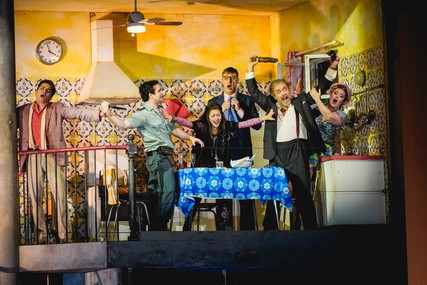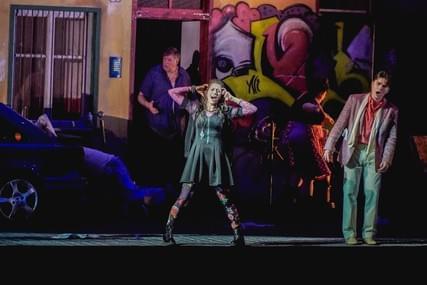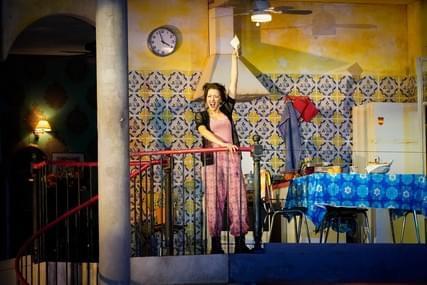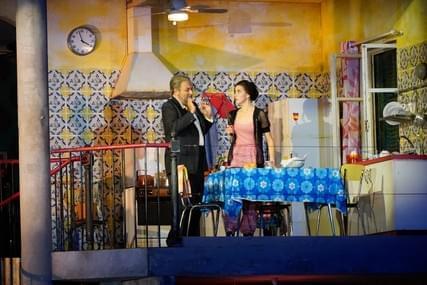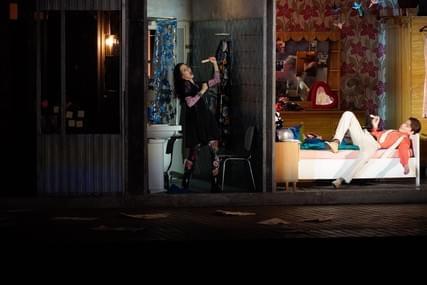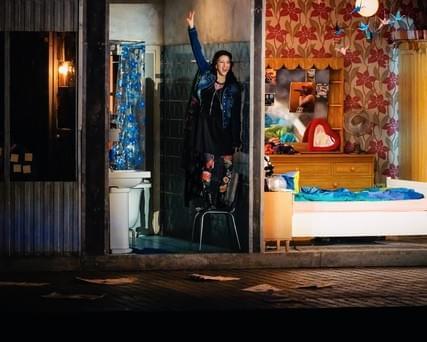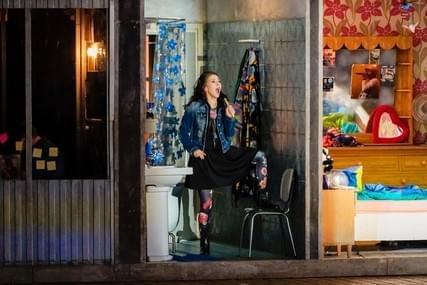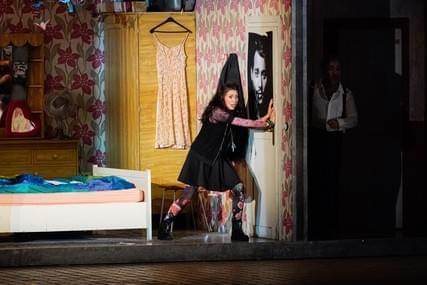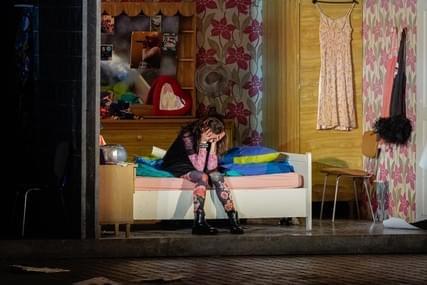Cast
| Il Conte d'Almaviva | Xabier Anduaga | |
| Bartolo | Carlo Lepore | |
| Rosina | Lisette Oropesa | |
| Figaro | Florian Sempey - 11 Jan - 20 Jan | |
| Figaro | Ilya Kutyukhin - 22 Jan - 12 Feb | |
| Basilio | Krzysztof Baczyk | |
| Fiorello | Tommaso Barea | |
| Berta | Marion Lebègue | |
| Un ufficiale | Bernard Arrieta | |
| Un ufficiale | Christian Rodrigue Moungougou - 01 Feb |
Carlo Montanaro
DirectorDamiano Michieletto
Set DesignerPaolo Fantin
CostumesSilvia Aymonino
LightingFabio Barettin
ChorusmasterAlessandro Di Stefano
About
In creating this ebullient opera buffa, Rossini captured all the fiery spirit of the comedy by Beaumarchais that inspired it. A native of Venice, birthplace of commedia dell’arte, Damiano Michieletto is highly sensitive to the burlesque vein in Rossini’s music. He transposes the action of this Useless Precaution to a modern-day Seville inspired by the cinema of Almodóvar. Bartolo’s monumental building, where Figaro’s free spirit whirls and twirls, allows this director to give free rein to his off‑beat imagination.
Media
Il Barbiere di Siviglia by G. Rossini - Trailer
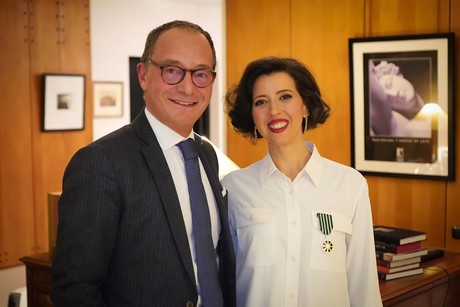
Chevalier de l’Ordre des Arts et des Lettres
Lisette is awarded the title of Chevalier de l’Ordre des Arts et des Lettres by the French minister of Culture.

International Opera Awards, Nominated
Lisette is nominated for best female singer for the 2020 International Opera Awards
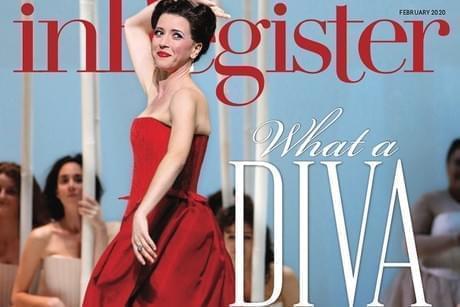
Lisette Oropesa on the cover of InRegister Magazine
Lisette Oropesa on the cover of InRegister Magazine for February 2020

Cover of Opéra Magazine, February 2020
Lisette is on the cover of Opéra Magazine for February 2020
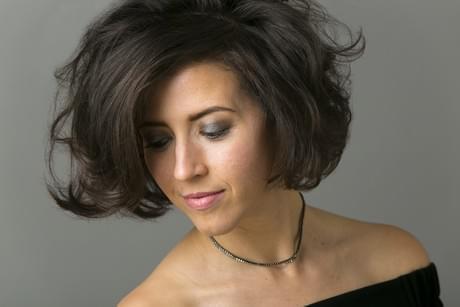
Lisette is interviewed in Toute la Culture
Lisette is interviewed in Toute la Culture
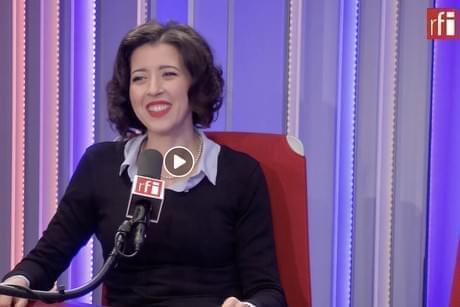
Interview - RFI en Español
Lisette is interviewed on RFI en Español

❄️Lisette's Winter Newsletter
❄️Lisette's Winter Newsletter

Podcast - France Musique
Lisette Oropesa is interviewed by France Musique about Barbiere at the Paris Opera
Reviews
Jeunes et prometteurs
Appréciée du public parisien depuis sa Marguerite de Valois dans Les Huguenots à l’automne 2018, Lisette Oropesa compose une Rosine en tout point captivante. La jeune soprano ne manque ni de piquant ni de charme. La voix est brillante, l’aigu aisé, les vocalises sont parfaitement exécutées et la ligne de chant ornementée avec subtilité. Actrice accomplie, elle évolue comme un poisson dans l’eau dans l’univers imaginé par Michieletto.Lisette Oropesa has been admired by the Parisian audience since her performance as Marguerite de Valois in Les Huguenots in the fall of 2018, she delivers an utterly captivating Rosina. The young soprano lacks neither spiciness nor charm. Her voice is brilliant, the high notes are easy, the vocalizations are perfectly executed and the singing line is subtly ornamented. An accomplished actress, she moves like a fish in water in the universe imagined by Michieletto.— Christian Peter • Forum Opera
Bastille resumes filming, resumption of the Barber of Seville in a striking climate
Lisette Oropesa finally returns and for the second time to Rosina, 17 years after her debut in the role (she posted a charming souvenir photograph of youth on social networks). The character here is even younger: a rebellious and sulky post-adolescent girl in Gothic attire. The American soprano embodies it with the plausibility of a teenage movie and does not forget to channel this sparkling and luminous game in the voice. With its long breath, it passes in one sentence from a colored high to a deep bass, then goes up in agile and sensual vocalizations from the low guttural to the high, moiré or shimmering, explosive or intensely contained .None— Charles Arden • Olyrix
“The Barber of Seville”, “Les Contes d'Hoffmann” or “Les Bains Macabres”: the lyrical year is well u
Cavalcades à tous les étagesInstallée dans un immeuble sévillan joliment décati, dont on nous révèle alternativement la façade et les intérieurs, l’efficace mise en scène de Damiano Michieletto fait cavalcader les chanteurs entre la rue et les étages. Non seulement cela ne semble pas coûter le moindre effort à Lisette Oropesa, 36 ans, marathonienne de choc à la ville comme à la scène, mais la soprano américaine, actrice très expressive autant que fine chanteuse, semble s’amuser énormément à camper Rosina en adolescente frondeuse, amoureuse et délurée. C’est aussi à l’opéra Bastille qu’on l’avait découverte, à l’automne 2018. Éblouissante Marguerite de Navarre dans Les Huguenots de Meyerbeer — elle y remplaçait, en catastrophe et pour le meilleur, la très attendue Diana Damrau —, Lisette Oropesa y fut ensuite une délicieuse Adina dans L’Elixir d’amour de Donizetti. Son soprano radieux, vif et agile fait merveille dans le rôle moins dramatique, mais tout aussi exigeant, de la juvénile Rosina. En attendant qu’elle revienne (comme on l’espère) à l’Opéra de Paris, les Provençaux la retrouveront le 18 avril au Grand Théâtre de Provence (Aix-en-Provence), en récital avec le ténor Juan Diego Florez, et les Franciliens l’entendront les 10 et 11 juin à la Philharmonie de Paris, dans les Carmina Burana de Carl Orff.**Cavalcades on Every Floor** Set in a charmingly dilapidated Sevillian building, whose facade and interiors are alternately revealed to us, Damiano Michieletto's effective staging has the singers galloping between the street and the floors. Not only does this seem to be effortless for Lisette Oropesa, 36, a real-life marathon runner as much as a stage one, but the American soprano, as expressively talented in acting as she is a refined singer, seems to thoroughly enjoy portraying Rosina as a rebellious, lovestruck, and vivacious teenager. It was also at the Opéra Bastille where she was first discovered, in the fall of 2018. Dazzling as Marguerite de Navarre in Meyerbeer's Les Huguenots—where she stepped in at the last minute, and for the better, for the highly anticipated Diana Damrau—Lisette Oropesa then went on to be a delightful Adina in Donizetti's L’Elixir d'amour. Her radiant, lively, and agile soprano works wonders in the less dramatic, but equally demanding role of the youthful Rosina. While waiting for her (hopefully) return to the Paris Opera, people from Provence will catch her on April 18 at the Grand Théâtre de Provence (Aix-en-Provence), in a recital with tenor Juan Diego Florez, and the Parisians will hear her on June 10 and 11 at the Philharmonie de Paris, in Carl Orff's Carmina Burana.— Sophie Bourdais • Télérama
Opéra National Review 2019-20: Il Barbiere di Siviglia
The Star of the ShowAmerican lirico-leggera soprano Lisette Oropesa took on the role of Rosina. She is well-loved by the Parisian audience, as she has stepped into the role of Marguerite di Valois in “les Hugenots” on very short notice last season and then stepped in as well into “L’Elisir d’amore,” combining rehearsals for the Donizetti work while performing the Meyerbeer opera at the Bastille. All the admiration she received on this particular night was well-deserved. Her timbre is dark, round, and completely even throughout her register. She tops off this combination with amazing, ringing high notes. She surprisingly sang the famed aria “Una voce poco Fa” in the mezzo-soprano key ( the aria is published in two different keys, with the soprano version one semi-tone higher) delivering sonorous low B naturals and C sharps. Her coloratura technique is depurated and immaculate, as well as her staccato notes and all the high interpolated high notes; it must be said that she was very cautious with variations, maintaining most of the original written lines. Her duet with Figaro was lively and cunning, again proving her amazing control of the middle voice. Her voice was quite present during the final concertante; choosing this time to sing Berta’s lines which are written for a soprano with two chromatic ascensions to high C; here her voice shined clearly over the rest of the cast, chorus, and orchestra. She took on her second act aria “Contra un cor” in the soprano key which is one and a half semi tones higher than the mezzo key. Her voice was constantly tasked with high Cs, which she pulled off beauifully. The rest of the aria was a masterful display of vocal fireworks well-rewarded by the audience. She kept her polished coloratura technique and sweet timbre for the trio with Figaro and Almaviva, and for the final scene, always adding subtle variation in order to preserve the integrity of the original melody. Oropesa was the true success of the evening, and she received a well-deserved long ovation at the curtain call.None— Mauricio Villa • Opera Wire



